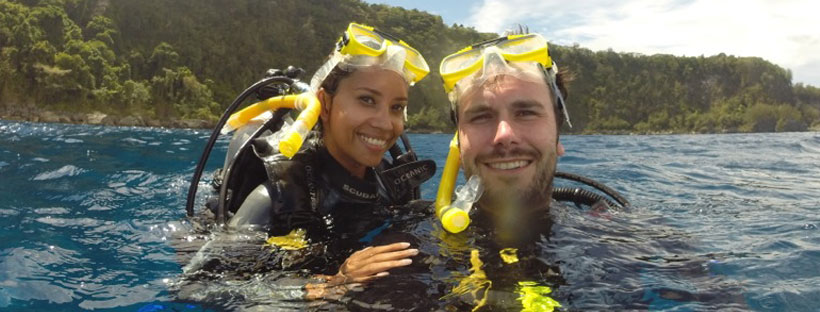After a year on the road and in each other’s pockets, Atlas and Boots share their top tips for travelling as a couple
I don’t tend to write about my relationship with Peter. We’ve been charting our year-long trip together but I’ve rarely talked about our relationship itself. As I explained in 7 things I struggled with in my first month on the road, this is partly because I haven’t always been 100% comfortable with publicly sharing our private moments.
More importantly, I haven’t felt the need to talk about our relationship. You don’t really when it’s right.
When a relationship is awful, you tell your friends about the drama and you offload your pain. When a relationship is new, you want to tell the world and shout it from your Facebook wall.

When a relationship is right, you don’t need to share, scream or shout about it because you have nothing to prove. That in a nutshell is my relationship with Peter.
That’s not to say that travelling as a couple has been 100% plain sailing. As illustrated in 6 months on the road, there have been a few tears and arguments. We’re not alone either.
Couples like the Travelling Apples have wondered if being on the road has weakened or strengthened their relationship. Naturally, it can go either way. Here’s how to do it as harmoniously as possible.
1. Agree to outlaw one annoying habit
Most travel experts (and indeed relationship experts) will tell you to accept your partner with all their quirks and foibles. They will tell you that this is doubly important on the road because you’ll be living in such close quarters. They will tell you to live with that one habit that drives you crazy. Here’s the thing though: if I could live with it, I’d live with it at home.
I don’t care about wet towels or toilet seats or toothpaste lids, but there is one thing I can’t live with: whenever Peter and I watch something together, he will spend the entire time absentmindedly stroking, fiddling and playing with his beard so all I see in the corner of my eye is that single distracting motion. I tell him to stop. He listens and then approximately seven minutes later, he starts again.
This is the sort of trivial thing I should be able to live with but I can’t. And so, on the road, we agreed to outlaw one annoying habit each.
Sadly, he has continued his habit but at least now I don’t feel like I am nagging him every time I tell him to stop and instead of feeling nagged, he is sheepish and apologetic that he just can’t help himself.
2. Share the admin
Peter loves poring over maps. He loves planning train journeys and boat trips and weaving together the fabric of our trip – all in his laidback, laissez faire style. In the South Pacific, I left him to it. The islands were so small, it would be no big deal if we missed a bus. Plus most islands used English as a national language so locals could help us fairly easily.
In South America, however, relaxed planning became an issue. For starters, if we missed a bus, we’d be an average of 15 hours away from where we needed to be – not exactly a short walk. Also, if Peter hadn’t noted down the address of our hostel as would often be the case, I as the (broken-)Spanish speaker had to try and get us there.
I realised that I couldn’t be annoyed at Peter for the holes in our plan because I hadn’t helped with the plan at all. From then, I started taking a more active role to take some pressure off him and alleviate some of my resulting stress.
He’s still struggling with the militant schedules and early morning drills.
3. Don’t start the blame game when a situation escalates
There’s a horrifying film called Open Water in which two divers are mistakenly left stranded in the middle of the ocean by their dive company. The couple starts off certain they will soon be collected.
They’re sure they’re in the right location and decide that the boat had to leave temporarily for some reason. As the film progresses, the couple’s initial confidence gradually devolves to confusion, anxiety, panic and then hysteria. As their emotions escalate, the girl starts to blame her partner (“Why don’t we stay with the group? We always have to do things different than everybody else” and “I wanted to go skiing.”)
The blame game is a familiar scenario on the road. You miss a train or boat and initially it’s fine and you laugh about it. And then it gets dark and cold and you’re tired and hungry so you start hinting that it’s the other person’s fault. Eventually, you end up bickering and then arguing.
Don’t start the blame game just because a situation worsens. Even if it is the other person’s fault, you were fine about it five hours ago. It’s not suddenly more their fault just because things got worse so bite your tongue.
4. Go separate ways
We met a couple in Tonga who would occasionally spend a day away from each other. If they had three days in Buenos Aires, for example, they would spend the third day doing their own thing.
Peter joked that I would spend my day in a library (maybe I would but libraries are beautiful and they have books. And they’re beautiful with all those books in them…)
We didn’t actually try this but we did spend a day apart in San Francisco when I was meeting friends of mine and he was hanging out with our hosts, old friends from London. When we met again in the evening, we both realised that we hadn’t been apart for a whole day in about six months. It was a strange feeling and made us appreciate being together again.
5. Don’t forego date night

About once a month, Peter and I put aside our walking boots, put on the cleanest things in our backpacks and go to a restaurant slightly above our budget. This was less important in the South Pacific because it was so naturally beautiful.
In South America, however, it has been a nice way to escape the noise, dust and traffic. Don’t let your constant proximity mask the fact that you need some quality downtime together.
6. Be mindful of mutual money
Every couple has a different attitude to money. In London, Peter and I kept separate finances so we never paid attention to each other’s spending. On the road, however, we have been spending from one big pot into which we put equal amounts of our travel fund. As such, we have been mindful that we’re spending mutual money.
Peter buys a coffee most mornings whereas I don’t drink coffee so we joke that I have a ‘coffee fund’ with which I can buy small (usually chocolate-based) treats. Thankfully, our discrepancies aren’t that pronounced. No couple wants to count pennies but if you’re having five beers to your partner’s one coke every evening, you may need to rein in the spending and be more mindful that you’re spending their money too.
7. Learn the other person’s fight style
When Peter is angry, you’ll know it. He shouts and swears and gesticulates more than an Italian gangster. I on the other hand will sulk for about 15 minutes after which I’ll usually be over it. In the early days, Peter used to try to coax me out of my sulks, consequently becoming frustrated at my unresponsiveness.
He has since learnt that he just needs to leave me alone; to not ask me any questions or make any demands; to let me process my anger and return to rational action. Conversely, I know that when he’s shouting, I need to let him shout.
If you learn the other person’s fight style and let them fight that way, you’ll find that arguments pass more quickly.
In addition to the above, understand and plan for your triggers. If you know you get irritable when you’re hungry, pack some cereal bars. If you get snippy when you’re cold, pack a fleece.
8. Act with kindness
I hate to come over all Awaken the Giant within but I thought this last point was worth mentioning as it’s the most sensible thing I’ve read about relationships.
In her 2014 article Masters of Love, Emily Esfahani Smith looks at scientific research on relationships, in particular what it is that keeps couples together. The short answer is kindness – an admittedly nebulous term. We can try to define what constitutes kindness based on research from psychologist John Gottman combined with that of psychological researcher Shelly Gable.
To use Smith’s example, let’s say your partner has received the excellent news that she got into medical school. She may say something like “I got into my top choice med school!” You then have four choices in how you react: active constructive (the ideal reaction), passive constructive, active destructive and passive destructive – see table below.
| Active | Passive | |
| Constructive | “That’s great! Congratulations! When did you find out? Did they call you?” (engaging wholeheartedly)
| “That’s great, babe” (reacting in a half-hearted, understated way) |
| Destructive | “Are you sure you can handle all the studying? And what about the cost? Med school is so expensive!” (actively diminishing good news) | “Oh, awesome. I’ve just won some Amazon vouchers!” (ignoring event or changing the subject”) |
This doesn’t just apply to big news either. To use another of Smiths’ examples, say a bird enthusiast notices a goldfinch fly across his yard. He might say to his wife, “Look at that beautiful bird outside!” (what psychologist Gottman calls a ‘bid’ for contact).
She can choose to put down her book and have a look (active constructive), give him a passive constructive “That’s nice”, ignore him altogether or say something actively destructive like “Stop interrupting me, I’m reading.”
It may sound trivial but the research shows that partners who answer bids positively are the ones with the healthiest and longest lasting relationships.











